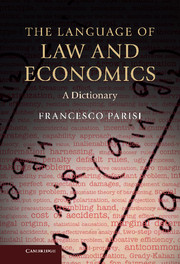H
Published online by Cambridge University Press: 04 August 2017
Summary
Hand formula: see Learned Hand formula.
Hands tying: a promisor can increase the credibility of his or her promise by cutting off some of its options. Hands tying refers to precommitment strategies that parties can undertake to cut off defection options and to foster cooperative outcomes. The term was introduced into the law and economics literature by Kronman (1985), in an article considering non-legal enforcement mechanisms. Kronman includes hands tying in the list of non-legal enforcement mechanisms, which also features hostages, collateral, and union. Hands tying strategies are defined as self-imposed conditional costs that make performance more appealing than breach for the promisor. For example, by publicly announcing and publicizing the completion date of a public work, a building contractor can credibly precommit to finishing the construction project by the due date. Hands tying generally involves some commitment by the promisor that will force him or her to take on additional losses or costs if he or she fails to perform. When the promisor ties his or her hands, the additional losses will automatically follow his or her breach, without need of action by the promisee. In our example, in the event of late completion, the contractor will face a reputational cost. This conditional cost can create incentives for timely completion even in the absence of legal penalties for late performance. Recent law and economics literature builds upon the findings of new institutional economics for the study of the effects and limits of hands tying as an instrument of contract enforcement. Even though the term was first used in the context of credible promises, its use in the recent literature has become virtually undistinguishable from the term “precommitment strategies” as introduced by Schelling (1966) in the context of credible threats. See also precommitment strategies, self-enforcing contracts, hostages, collateral, union, relational contracts, cooperative games, and non-cooperative games.
- Type
- Chapter
- Information
- The Language of Law and EconomicsA Dictionary, pp. 133 - 144Publisher: Cambridge University PressPrint publication year: 2013

